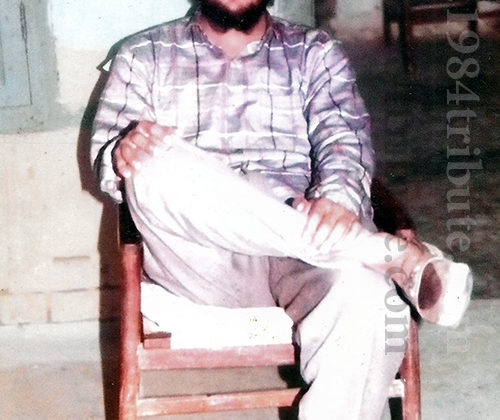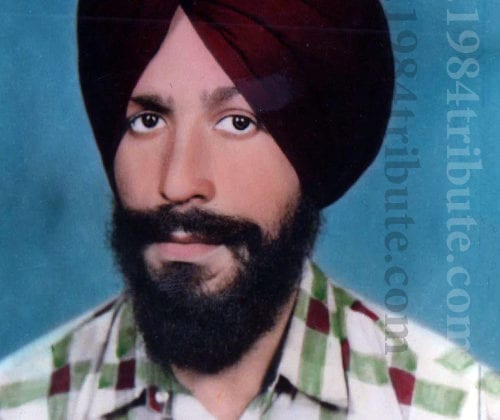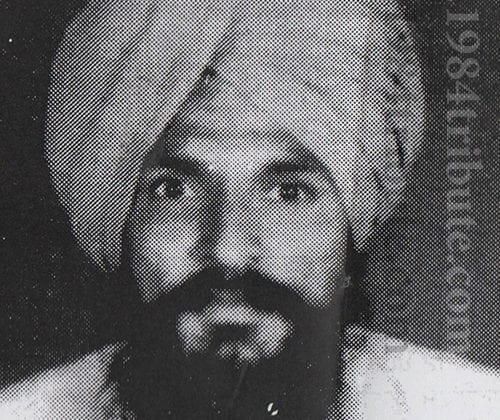Shaheed Bhai Piara Singh Fauji
Shaheed Bhai Piara Singh Fauji
Babbar Khalsa
Bhai Piara Singh Fauji was born in the year 1954, in a poor farming household to parents Sardar Teja Singh and Mata Surjit Kaur, residents of village Rupowali, near Baba Budha Sahib, station Kathunangal. Bhai Sahib had 2 elder sisters, Bibi Amarpal Kaur (Pyari), Bibi Charanjit Kaur, and 2younger brothers, Bhai Jagtar Singh and Bhai Gurnam Singh. Bhai Sahib’s parents were Amritdhari and the whole family had great love and respect for Sikhi.
Bhai Sahib took up the practice of service and prayer to Waheguru in his early childhood and was baptized (although he had to give that up when he joined the Indian army). Bhai Sahib received his religious training from the Granthi Singh of his village Gurdwara. Bhai Sahib was an exceptional student who could eventually perform the duties of his teacher and came to be known as a good ‘Granthi Singh’ in nearby villages.
By the time he was of 19-20 years, Bhai Sahib was working in a factory in Verka’s Vijay Nagar, near Amritsar. Bhai Sahib worked at this place from 1974 to 1982 and in 1982, he applied for the army and was inducted into 8th Sikh Regiment. Bhai Sahib learnt driving and took up the post of a driver in the army, he used to drive the officers of his regiment. In June 1984, during the attack on Sri Akaal Takht Sahib, Bhai Sahib was amongst the Dharmi Faujis who rebelled against their regiments and later drove his companions towards Amritsar in a truck. On their way, they had a confrontation with the army on the Harike Bridge. Bhai Sahib sustained a bullet in his thigh and was arrested along with his associates. Bhai Sahib was court marshalled and was sentenced to two years in prison. Upon his release, he returned to his service in the army and continued working there until October 1989.
In the month of October 1989, using his leave as an excuse, Bhai Sahib left the Indian army for good. This was marked by his entry into Bhai Dharam Singh Kashtival’s Babbar Khalsa group. Bhai Sahib participated in many Jhujaru activities from then on and was involved in many killings of anti-Sikh elements. Some are mentioned below:
• Bhai Sahib was involved in the well-known encounter with Indian security forces in the village of Varpal. In this encounter Bhai Sahib showed his battle skills and great bravery. The Jhujaru Singhs slayed many police officers in this encounter before escaping safely.
• Bhai Sahib took upon himself to spot government sympathizers, police informants and other traitors in the surrounding areas of his village and brought them to their demise. Amongst these people were two comrade brothers of his village, who spewed venom against the Jhujaru Singhs. A woman, who was a regular police informant of the village was punished by Bhai Sahib for her schemes. Similarly, a comrade from village Muddal was brought to justice also.
• Bhai Sahib also targeted government sources, such as ambushing police stations and CRPF checkpoints.
In this way, Bhai Sahib spent his lifetime serving the common people’s interests. While he was in the army, Bhai Sahib used his salary to help the poor and the needy. Bhai Sahib’s entry into the Khalistan movement escalated his selfless service. Bhai Sahib arranged marriages for girls from poor backgrounds, provided monetary aid to poor families, helped village Gurudwaras in their activities and solved issues of the people in a just manner. In January 1991, Bhai Sahib was married to Bibi Balwinder Kaur (Nava Pind, near Barkiwal, Batala, district Gurdaspur). Bhai Sahib was blessed with two daughters- Bibi Lovepreet Kaur and Bibi Manjinder Kaur. Bhai Sahib continued to be a part of the Sikh freedom movement after his marriage and his wife supported him with his zeal to serve the community.
It was on 5th May 1992 when Bhai Sahib attained martyrdom happily like his Jhujaru brothers before him. On 2nd May 1992, Bhai Sahib had been staying at a hotel in Jandiala, planning for future Jhujaru actions. Bhai Sahib was waiting for his companions and had no weapons on him at this time. In the meantime, a traitor informed on Bhai Sahib’s location to the Punjab police. The police surrounded the hotel within hours and arrested Bhai Sahib. From then until 5th May, the police tried their best to make Bhai Sahib reveal whereabouts of his Jhujaru brothers, but this was met with no success. The police retaliated by torturing Bhai Sahib inhumanely. In the end, in the night of 5th May 1992, the police killed Bhai Sahib in a fake encounter near Shimla Puri, Ludhiana. The police refused to hand over Bhai Sahib’s body to his family and cremated him in an unknown crematorium.
After his martyrdom, Bhai Sahib’s family members witnessed an increase in harassment and torture. A police funded ‘black cat’ residing in the same village took control of Bhai Sahib’s house and expelled his family. The family was forced to sell the house and 2 acres of land at meager price. They settled in Uttar Pardesh and worked for daily wages for their living. During this time, Bibi Balwinder Kaur chose to remarry Bhai Sahib’s younger brother Bhai Gurnam Singh, so as to spend the remaining days of her life. But tragedy struck again, when the two acres bought in Uttar Pardesh were flooded and the family had to return to Punjab empty handed. After a while, Bhai Gurnam Singh took up the job of a watchman at the construction site of Anandpur Sahib’s heritage wonder. However, once the organizers found out his past, they sacked him and the family had to move to the village of Munda near Goindwal Sahib. There the family started Sewa in the village’s Gurdwara Sahib. After 2 years of stay there, today the family lives as a tenant in village Sultanwind, Amritsar, where they have lived for the past 10 years. Bhai Gurnam Singh works on a very low wage as driver in a private bus. The family suffers as the wage is not regular and is delayed for many days. The family has been living a life of hardship.
Information given by the family of Shaheed Bhai Piara Singh Fauji












